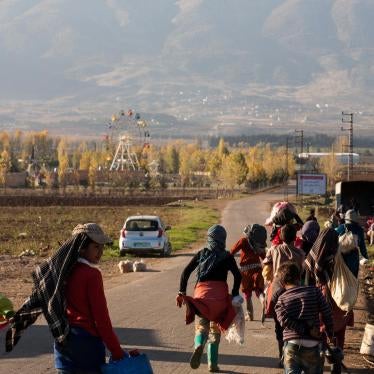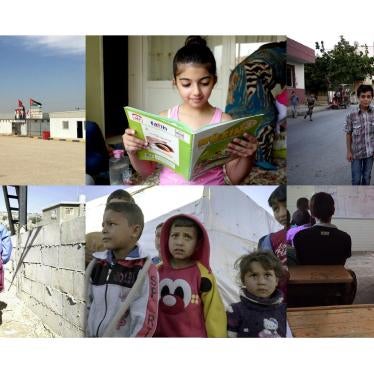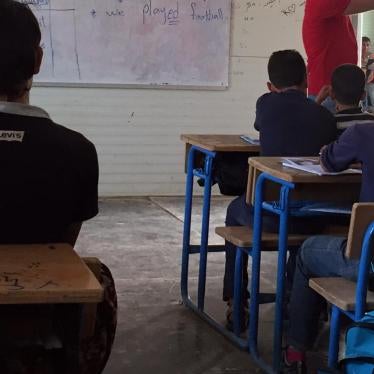Lebanon has put larger, richer countries to shame by taking in 1.1 million registered Syrian refugees, including nearly 500,000 school-age children. The government estimates the total number, including unregistered Syrians, is 1.5 million. The Education Ministry has taken on the challenge of trying to enroll all children age 3 to 18, regardless of nationality or legal status. But five years into the war in Syria, and despite considerable efforts, more than 250,000 Syrian children are out of school. This is an immediate crisis.
Rana, 31, a Syrian refugee in Lebanon, has been trying for years to enroll her children, but hasn’t been able to afford the transportation fee of 45,000 Lebanese Lira per month for each child. Her 10-year-old son, Hamza, is selling chewing gum on the street instead of attending class.
Rana found a job at a pastry shop in Saida, but had to quit when her residency expired, afraid of being arrested on the way to work. At the very least, “my children should learn to write their names,” she told me. “It’s over for us, should it be over for our children as well?”
Lebanon last year opened 200,000 spaces for Syrian refugees in public schools, but only 158,000 children enrolled, and 10,000 fewer actually attended. According to the Education Ministry, another 87,000 enrolled in private or “semi-private” schools. My research for a new Human Rights Watch report found that several barriers are keeping Syrians from going to school, many of which could be alleviated with increased donor support. But Lebanon’s residency policy for Syrian refugees has perhaps been the most damaging.
Lebanon adopted new rules in January 2015 that have effectively barred many Syrian refugees from maintaining legal residency. Families without residency face restrictions on their movement and ability to find work, are more likely to rely on child labor, and may be unable, like Rana, to pay for school-related costs. Some school directors demand valid residency as a condition of enrollment, in contravention of the Education Ministry’s policy. And parents without residency are sometimes afraid to enroll their children in schools beyond checkpoints, where they themselves cannot go.
Under Lebanon’s residency regulations, all Syrians 15 or older must pay US $200 per year to maintain their legal status. They must also either sign a pledge not to work or secure—often by paying for—a Lebanese sponsor. Humanitarian agencies estimate that two-thirds of Syrians in Lebanon have been unable to renew their papers.
Children face particular challenges to residency renewal when they turn 15 and must present their own individual identification card or passport, which many do not possess and are fearful of entering the Syrian embassy to obtain. Without residency, they are vulnerable to arrest at checkpoints on the way to school. As a result of that, and increased pressure to work, just 3 percent of the secondary-aged Syrian children registered in Lebanon are enrolled in public secondary schools.
It is not in Lebanon’s interests to maintain a residency policy that is forcing children into an uneducated, impoverished, and illegal status. When today’s children are ultimately able to return safely to Syria, is it not best for Lebanon to ensure that they have an education and the skills to rebuild their devastated country?
Lebanon has an opportunity to leverage international funding and attention to strengthen a public education system that struggled before the refugee crisis, through projects to rehabilitate schools, increase teacher training, and provide quality inclusive education for children with disabilities. Lebanese children have already benefited from international assistance; donors covered enrollment fees for all 197,010 Lebanese students in basic education last year.
This problem is going to get worse. Most Syrian families have depleted their savings and gone into debt. Lebanon should allow Syrians to maintain legal status by waiving the annual fee, the pledge not to work, and sponsorship requirements. In a February fundraising appeal, Lebanon acknowledged the need to review the regulatory frameworks related to residency and work authorizations. But so far, it has taken no such steps.
As families look to the beginning of the 2016-17 school year, Lebanon and international donors should ensure that children are not denied an education. The future of children across the country is at stake.









